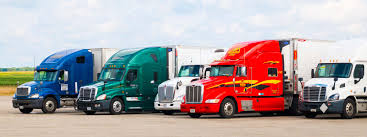Which Means Of Transportation Should You Choose For Your Goods: By Truck Or By Train?
There has been a lot of debate about the necessity to limit the ecological impact of shipping by truck. The government has been thinking of alternative solutions such as shipping goods by train or making use of the electrification of transportation of goods. Here are some indications that will help you to choose the type of transport best suited to your needs.
The advantages of shipping by train compared to shipping by truck:
- A fuel consumption economy (reduction in the dependency on oil products) ;
- Pollution reduction (greenhouse gases) ;
- Reduction in traffic buildups ;
- Increased road security with less trucks on the roads ;
- Secure goods;
- Ideal for large volumes and long distances ;
- Economic for long distances.
The disadvantages of shipping by train compared to shipping by truck:
- Handling and bulk breaking ;
- Dependency on road haulier for pre and post carriage with final delivery ;
- Lack of flexibility ;
- Problems or incidents on the road network (snow, etc.) ;
- Not adapted to short distances ;
- Uncertainty about departure and arrival dates ;
- Safety issues for the population in the transportation of dangerous goods.

Shipping By Truck Gives More Flexibility
The advantages of shipping by truck compared to shipping by train:
- Provides Door-to-Door Services
The first and foremost advantage is truck transportation provides door to door services to anyone who wishes to get the goods and services available at their doorstep. Trucking industries are much benefitted from these services. Local transportation companies help in providing day to day services.
- Best Mode of Transportation
It is the best mode of transportation and is the cheapest of all. It is very good for short distances travels and hauls as it provides the best traveling experience. It is best suited for traveling within 700 km of distance.
- Useful for Goods & Services
Another advantage is that now the online booking of the trucks could be done easily and which will be useful for goods and services to be transported. So, it becomes very easy for users to book whenever they want.

Flexibility: The Major Advantage Of Truck Transportation
As you can see, transportation via heavyweight vehicles such as trucks has a considerable advantage in comparison to other means of transportation: flexibility. Whether it is due to versatility, thanks in particular to the ways in which loading/unloading is carried out; or due to the ability to adapt to roadway conditions (such as weather conditions and traffic), truck transportation will definitely satisfy all your transportation needs. This has never been more true, as truck transportation increasingly uses technological benefits and enhancements, which make these companies even more efficient when transporting your cargo. This technology has given these companies undeniable logistical advances, notably in terms of communication and organization.

Cons of shipping by truck
- Limitations on size and weight
Different states may have laws prohibiting truckload shipping goods whose weight or size exceed certain limits. This may mean that the cargo being moved may have to be limited to the set maximum weight or size.
- Affected by weather and road conditions
Shipping goods by truck is subject to interference by weather conditions and even the state of the roads where the movement of goods could prove difficult during rain, snowy seasons, and so on, or if the area has no tarmacked (all-weather) roads.
- Slower over long distances
Compared to rail shipping, truck shipping is quite slow over longer distances.
- Expensive over long distances
Transporting goods by truck is not cost-effective over long distances. Rail transport is a better option in this case.
- Unfriendly to the environment
Trucks emit a lot of smoke and other pollutants to the environment. They also deplete the scarce petroleum resources in a bigger way due to the size of the load carried, all of which harms the environment.
Benefits Of Shipping LTL Freight:
Regardless of the mode of transportation, the question remains the same: how can I get my product to market as fast as possible and at the lowest cost available without sacrificing service? Like ocean or air freight, trucking is another extension of this timeless quandary. Long gone are the days when everyone owned their own trucks and those trucks went to a handful of warehouses and distribution centers. Shipping has become more fragmented and spread out over further distances. A drop ship here, a fulfillment center there, and all points in between.
Shippers are presented with three different yet distinct options when shipping via ground. Their choices are parcel, LTL (less than truckload), and TL/FTL (full truckload). If you’re unfamiliar with shipping via LTL, unaware of LTL as a service, or would simply like to know more then read on.
Here are five key benefits of shipping LTL freight:
- Time To Market
The single greatest advantage of LTL shipping is that you no longer have to wait for a full truckload to get your product to your buyer. Instead of waiting for enough orders in a region to maximize your load, or send a half empty truck, you can book your goods immediately and have them on their way to the consignee ASAP.
- Less Warehouse Space
Every shipment you send out frees up space for new inventory within your warehouse. Why sit on freight and let purchase orders age when you can churn product and ship on-demand to your customers? Not only does this allow for a lean process flow within your warehouse, but it also allows the consignee to purchase in shorter cycles while reducing their own inventory.
- Cost
With LTL you’re only paying for what you ship. Your freight charges are based on the class, space, and weight that you take up on the truck instead of the entire haul. These are substantial savings that actualize themselves not just over time, but every time you ship. There is a myriad of ways to further reduce costs via consolidations, common routing, back haul loads, etc. However, LTL freight isn’t without capacity issues or surcharges. Review out LTL Capacity Crisis Survival Guide for more on that!
- Service Options
When negotiating LTL rates carriers can and often will provide services beyond dock to dock. Shippers can specify needs like lift gates, inside pick-up and delivery, cross docking, non-commercial shipments, event notifications, cargo tracking, etc.
- Tracking & Security
Your buyer is going to want to know where and when they’ll receive their shipment. Many LTL carriers provided tracking details that include event notifications which will allow them to see in real time when their goods are picked-up, in transit, on time/delayed, and dropped off.
- Tracking can be tailored to customer needs based on BL, PO, reference number, or even a date range. In addition, unlike parcel service, your goods will often be palletized which prevents damage, pilferage, and other loss.